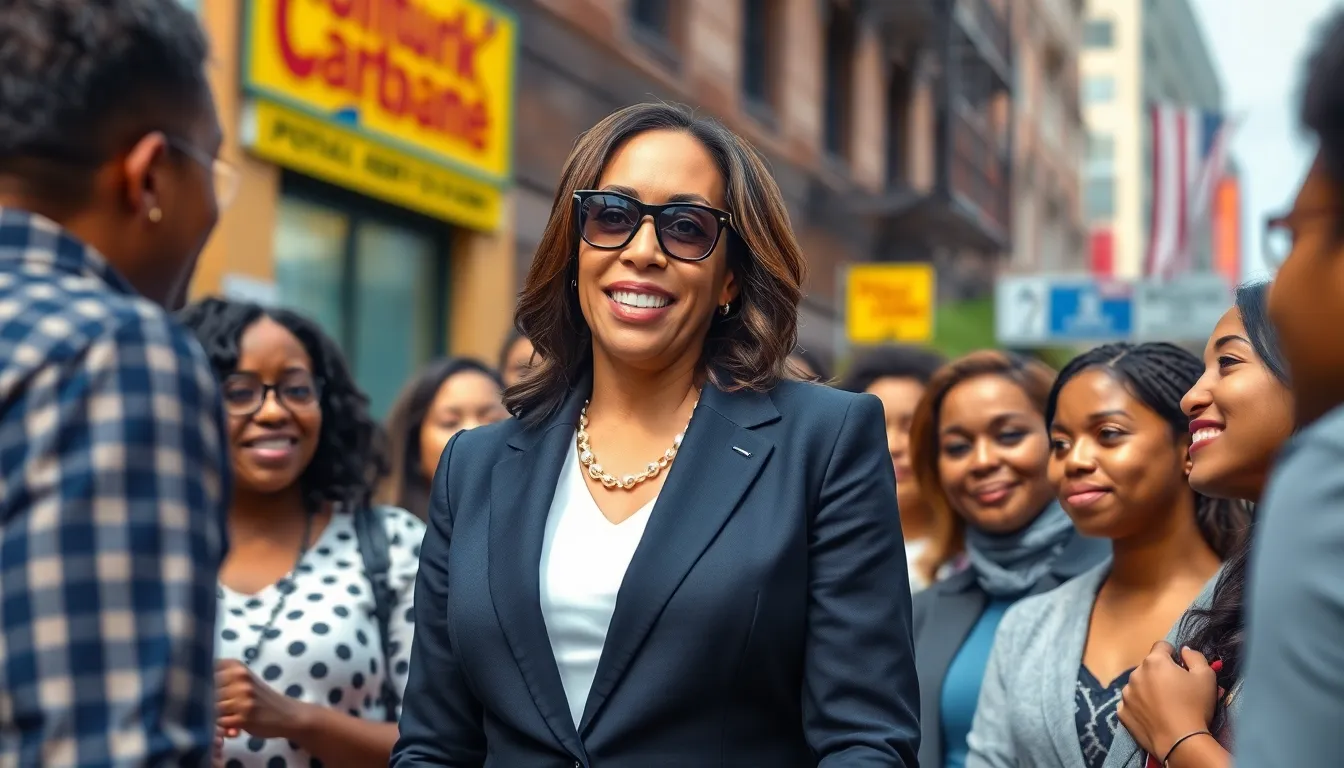As the political landscape heats up ahead of the next election cycle, speculation swirls around prominent figures and their intentions. One name that consistently surfaces in discussions is Kamala Harris, the current Vice President of the United States. With her unique background and experience, many are eager to know if she’ll throw her hat into the presidential ring.
Harris has made significant strides in her political career, breaking barriers and championing key issues. As the country navigates complex challenges, her potential candidacy could reshape the dynamics of the race. Voters and political analysts alike are keen to understand her plans and the impact they could have on the upcoming election.
Table of Contents
ToggleOverview of Kamala Harris
Kamala Harris, the 49th Vice President of the United States, holds a significant place in American politics. Elected in 2020, she became the first female vice president, the first Black vice president, and the first person of South Asian descent to serve in this role. Prior to her vice presidency, she served as the U.S. Senator from California from 2017 to 2021.
Harris’s political career includes notable achievements in various areas. As a senator, she focused on issues such as criminal justice reform, healthcare accessibility, and climate change. She played a critical role in the introduction of legislation aimed at reducing gun violence and promoting equity in education. Additionally, she has been a vocal advocate for immigration reform and women’s rights.
Her background as a former prosecutor influences her policy perspectives. Harris emphasizes the importance of fair justice practices and community safety. Her leadership style combines accountability with collaboration, aiming to build coalitions across party lines.
As speculation grows about her potential presidential candidacy, analysts point to her experience and high-profile role in the Biden administration. Harris’s visibility during significant national events positions her as a prominent figure in Democratic politics, making her intentions a focal point for voters and party strategists alike. The upcoming election cycle could redefine her political trajectory and influence the Democratic Party’s platform moving forward.
Current Political Landscape

The political climate remains dynamic as the election approaches, with various players and opinions influencing the potential candidacy of Kamala Harris.
Key Players and Contenders
Kamala Harris faces various key players in the Democratic landscape. President Joe Biden’s administration affects her positioning, as some speculate whether he will pursue reelection. Other potential contenders include California Governor Gavin Newsom, who has significant support, and former presidential candidate Elizabeth Warren, who maintains influence within party circles. Notably, behind-the-scenes maneuvers among these individuals could shape Harris’s decision to run. Candidates’ strategies will also align with evolving party priorities and voter concerns, impacting their viability in the primary process.
Public Sentiment and Polls
Public sentiment towards Kamala Harris shows mixed results based on recent polls. Some surveys indicate significant backing, particularly among younger, diverse voters who value her groundbreaking achievements. In contrast, other polls reflect concerns about her approval ratings, with some voters citing dissatisfaction with current administration policies. Tracking polling data reveals fluctuating support, emphasizing the importance of Harris’s outreach strategies and engagement as the election cycle develops. The combination of these insights will likely influence her decision on entering the presidential race.
Kamala Harris’s Political History
Kamala Harris possesses a distinguished political background marked by significant accomplishments and challenges. Her trajectory reflects a blend of innovation in policy and the complexities of political life.
Major Achievements
- Senate Tenure: Harris served as the U.S. Senator from California from 2017 to 2021, where she emphasized criminal justice reform and advocated for the Equality Act, aiming to protect LGBTQ+ rights.
- Healthcare Initiatives: She supported the expansion of the Affordable Care Act and introduced legislation to lower prescription drug prices, aiming to enhance healthcare accessibility for all Americans.
- Environmental Policies: Harris has championed climate change initiatives, co-sponsoring the Green New Deal and promoting renewable energy investments.
- Social Equity: She prioritized education reforms, advocating for equitable funding and support for underserved communities to improve educational access and outcomes.
- Historic Vice Presidency: Harris’s election as the first female vice president and the first woman of Black and South Asian descent to hold the position marks a significant milestone in U.S. history.
Controversies and Challenges
- Criminal Justice Record: Harris’s past as a prosecutor faces scrutiny. Critics argue her policies contributed to mass incarceration, particularly affecting minority communities.
- Public Perception: Polls show fluctuating approval ratings for Harris, with some voters expressing concerns about her effectiveness and alignment with progressive values.
- Political Dynamics: Navigating relationships within the Biden administration and managing tensions with party factions present ongoing challenges that influence her public image.
- Immigration Policy: Harris faced criticism regarding her handling of immigration issues, including her response to the surge of migrants at the southern border, which some constituents viewed as ineffective.
- COVID-19 Response: The administration’s pandemic policies received mixed reviews, with some voters attributing frustrations to Harris’s role in the broader response strategy.
This political history, marked by achievements and controversies, shapes the ongoing discourse around Harris’s potential candidacy for president and her positioning within the Democratic Party.
Speculation on Presidential Bid
Speculation about Vice President Kamala Harris’s potential presidential bid intensifies as the election cycle advances. Observers note her recent actions and public statements as indicators of her political intentions.
Recent Statements and Actions
Harris recently addressed key issues in public forums, framing her responses around pressing national matters such as voting rights, women’s reproductive health, and climate change. Her speeches often emphasize overcoming challenges and promoting unity, signaling her readiness to lead. Additionally, she has maintained a robust presence on social media, engaging with constituents and promoting policies that resonate with younger and diverse voter demographics. These ongoing activities indicate her desire to solidify her role as a leading voice within the Democratic Party and demonstrate her readiness for a potential presidential campaign.
Analysis of Support and Opposition
Support for Harris among younger and more diverse voters remains strong, with polls often reflecting enthusiasm for her progressive policies. Analysts note her notable ability to energize these demographics, essential for Democratic success in the upcoming election. However, some established party members express reservations based on her past as a prosecutor and the mixed public sentiment regarding her handling of specific issues, such as immigration and public safety. These contrasting perspectives on her leadership style and policy decisions create a complex landscape she must navigate as speculation mounts about her presidential aspirations. Monitoring these dynamics could provide valuable insights into her potential candidacy.
Potential Impact of a Candidacy
Vice President Kamala Harris’s potential candidacy could significantly influence both the Democratic Party’s direction and the dynamics of the 2024 election. Her unique background and policy positions may attract various voter demographics while also presenting challenges for the party.
Effects on the Democratic Party
Harris’s candidacy could reshape the Democratic Party’s ideological landscape. Her progressive policies and focus on social justice resonate with younger and diverse voters, enhancing the party’s appeal among these groups. Advocacy for issues like healthcare, climate action, and equity could solidify the party’s commitment to progressivism. However, her past as a prosecutor raises concerns among some established party members regarding criminal justice approaches, affecting intra-party unity. Navigating these tensions will be crucial for maintaining a cohesive platform that attracts a broad coalition of voters.
Implications for the 2024 Election
Harris’s potential run may alter the electoral dynamics for the 2024 election. Her visibility as a candidate could mobilize younger voters who prioritize issues like reproductive rights and climate change. Polls indicate strong support among these demographics, which could boost voter turnout in critical swing states. Conversely, her approval ratings and controversies surrounding her past could weaken her position against Republican contenders. As the election approaches, strategic decisions regarding her campaign focus and message delivery will profoundly affect both her candidacy and the broader electoral landscape.
As the 2024 election approaches the spotlight on Kamala Harris intensifies. Her unique position as a trailblazer in American politics combined with her advocacy for progressive policies makes her a compelling candidate. The impact of her potential run could reshape the Democratic Party’s strategy and voter engagement efforts.
While her past as a prosecutor presents challenges her ability to connect with younger and diverse voters may bolster her appeal. Observers will continue to watch her actions and statements closely as they gauge her readiness to lead the charge for the Democratic nomination. Ultimately her decisions in the coming months will play a pivotal role in determining not just her political future but the broader electoral landscape as well.



